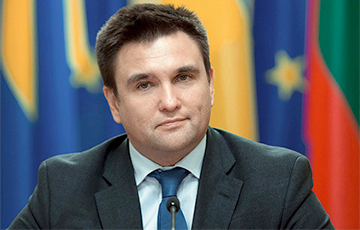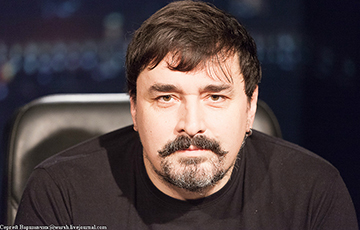NATO – The Most Efficient Security Model For Belarus In Future
9- Pavlo Klimkin
- 4.04.2024, 23:24
- 13,204

Ukraine can and should become a driver for Belarus.
NATO is celebrating its 75th anniversary today. The Charter97.org website begins publishing articles from the “Belarus in NATO” book by the European Belarus Foundation. The first article was written by Pavlo Klimkin, the former Foreign Minister of Ukraine and co-founder of the Center for National Resilience & Development.
The current security of Belarus is at an all-time low since its independence. Its sharp deterioration is determined by a variety of factors that begin to add up to a single mosaic. A systematic analysis of these factors is impossible within the framework of a short review and requires considering more than just open sources, especially to model their mutual influence and possible “resonance” or even explosive effect. However, the main elements affecting the security of Belarus are quite clear for general analysis of the situation.
First, the critical level of coordination of foreign and domestic policies with the Russian Federation.
This does not mean that the Belarusian leadership is not capable of making its own decisions in domestic politics, but its field is limited by financial and economic dependence on the Russian Federation. “Harmonization” of the economic space will make this independence rather formal. There is virtually no room for maneuver under the current conditions in matters of foreign policy.
Second, Belarus is a member state of the Collective Security Treaty Organization (CSTO), but at the same time, it is the only state within the organization that has provided its territory and infrastructure for Russian aggression against Ukraine. This made Belarus not only a formal legal ally, according to CSTO documents, but also a de facto ally of the Russian Federation, which must bear political and legal responsibility for the consequences of the aggression. The imposed sanctions are a part of this responsibility. The sanctions cannot be lifted or weakened until the end of the war and, accordingly, until the responsibility is defined and consequences are faced. Other CSTO member states are taking a formally neutral position and going on with “balancing”. Return to the status quo is already impossible for Belarus as the point of no return has passed. At the same time, Belarus bears legal responsibility for providing its territory as a base for the deployment of Russian forces and also shares responsibility for all the criminal actions of the Russian Federation.
Third, Russian Armed forces are still using the infrastructure of Belarus not only for the deployment but also for the attacks on the territory of Ukraine. This means that the leadership of Belarus has agreed to participate in the continued aggression and thus its responsibility keeps growing. This raises the question of the necessity and legitimacy of actions to prevent such developments on the territory of Belarus.
Ukraine has the right to self-defence, which is not limited to the territory of Ukraine within the framework of international law and, in particular, the UN Charter.
Accordingly, further escalation of sanctions and other pressure also makes sense and meets the key principles of international law.
Fourth, Russian tactical nuclear weapons are placed in the territory of Belarus. This makes Belarus a target for special monitoring by NATO and its member states and also incorporating planning a response to threats of a nuclear strike from the territory of Belarus, including the re-targeting of some means of deterrents. There are carriers of these tactical nuclear weapons on the territory of Belarus, which in terms of strategic deterrence puts it on the same level as the Russian Federation. Accordingly this changes the nature of the necessary response measures, taking into account the proximity of the location of nuclear weapons and the carriers to NATO member states and Ukraine.
Fifth, the level of infiltration by Russian security forces and other structures has reached a critical level, and it is no longer possible to determine to what extent the Belarusian leadership controls them. It can be assumed that the Russian Federation can already now exercise effective control over the elements of these structures, and probably over the structures as a whole.
Sixth, following this, Lukashenka’s alleged “participation” in negotiations around the pacification of Prigozhin’s coup extended Russian domestic politics to Belarus, and the deployment of the remnants of Wagner’s troops on its territory clearly confirms this. Moreover, Belarus is affected by Wagner's activities abroad, which also makes it a legitimate target in terms of countering the Wagner Group.
Seventh, the Russian Federation uses the territory of Belarus for provocations against Poland and Lithuania, deliberately and artificially creating “tension” on the border by establishing supply chains for the so-called “refugees”. Belarus's neighbours have to spend significant resources to reduce these threats, including media efforts.
It's obvious that all the developments associated with the Russian Federation will, directly and indirectly, affect the security of Belarus even without going into all the details. Moreover, Belarus, under current conditions, is vulnerable to any changes or even moves in Russian domestic politics.
The Russian Federation believes that Belarus belongs to the so-called “Russian world”. Both the Russian leadership and the Russian people agree with this. Accordingly, Belarus has "conditional" independence, since it is in the real sphere of influence of the Russian Federation. Russia considers the so-called “Union State” project temporary. The goal of this project is the actual absorption of Belarus.
Belarus took an advantageous position and supported its economy through its jurisdiction over its territory to circumvent the sanctions imposed on Russia. However, this advantage was negated on February 24, 2022. The Belarusian economy is critically dependent on the Russian one under the sanctions, even when trying to balance it out with the help of China. Russian business is inextricably linked with the Russian power clans and it's obviously using this situation to strengthen its position in Belarusian economic affairs.
Belarus can retain the formal attributes of independence only on the condition that all elements of the country’s state structure are subordinate to Russia, but even such an option is a risk for the Kremlin. Changes in the consciousness of Belarusians, the strengthening of national identity and the change of generations - all these will gradually separate Belarus away from Russia. The current leadership of Belarus relies heavily on the generation that still remembers the USSR, yearns for it and sees its reincarnation in modern Russia. However, it is obvious that Belarusian society is capable of independent thinking and analysis of the situation even in the conditions of total propaganda and the dominance of official rhetoric. Russia's dominance will obviously cause resistance and protest. Russia will lose its position even if the situation develops moderately and gradually. This means that time is working against the Kremlin and the current level of control over Belarus does not provide future guarantees, which means that the status quo can only be short-term and cannot suit the Russian Federation for the future.
The authorities managed to overcome the protest surge after the last rigged presidential elections but it also gave many a hitherto unprecedented feeling of the ability to influence events in the country. Even in a latent state, this feeling constitutes a fundamental challenge to both current Belarusian and Russian leadership.
Russian aggression against Ukraine temporarily protects Belarus, since launching one of the Russian plans to reset Belarus in these conditions will create new, unpredictable, risks. Nevertheless, the Kremlin will launch these plans if it feels that time is working against it and that the risks can be minimized. This creates an extremely dangerous situation for Belarus and raises the question of a permanent and long-term vision of security for Belarus.
Russian aggression against Ukraine has completely destroyed the existing security system in Europe. It's impossible to return to the previous situation even with all its shortcomings. The security model for Ukraine should become part of the European model. In general, there are three solution sets.
The first involves the creation of a stable Ukrainian state with a strong and combat-ready security and defence sector, the provision of the necessary types and quantities of weapons, as well as sufficient financial support that is, turning Ukraine into a kind of “porcupine”. The operational implementation of this model is possible through some agreements or arrangements with certain states and/or international organizations. This model is often called the “Israeli” model, although this is not entirely true. Israel has nuclear weapons, albeit unofficially, while Ukraine does not, and this is a critical difference. Also, Israel's agreements with the United States provide the concept of “qualitative military superiority”, which Israel must maintain. In the case of Ukraine, a similar concept with the code name “quality deterrence capability” is needed, which should be integrated into the overall NATO concept of deterrence of the Russian Federation even before Ukraine joins NATO.
The second provides for a system of security guarantees for Ukraine - unilateral or multilateral. These must be legally enforceable and credible guarantees, similar to those the United States provides to Japan or South Korea based on the concept of “extended deterrence”. It is obvious that the United States must be part of the system of these guarantees, which, in turn, raises the question of Ukraine’s immediate entry into NATO. There are risks of European fragmentation in NATO's strategy as the solidarity of the NATO members is the decisive factor.
And finally, the third provides for Ukraine's membership in NATO. This is the only permanent and clear option in terms of obligations and deterrence, it leaves no “grey zones” and uncertainty - legally and politically.
Obviously, these options are not mutually exclusive and may overlap. It is also obvious that successful integration of Ukraine into the EU is impossible without a stable and reliable security element. Membership in the North Atlantic Alliance is the only way to achieve this in the future.
In this regard, the question arises about the security model for Belarus and its place in the European security system, since the current situation can only lead to the establishment of Russian control over Belarus, with or without the formal statehood attributes. Attempts to annex Belarus will cause long-term protests in Belarusian society, which the Russian Federation will not be able to minimize. Belarus can't exist as an independent state, as being Russia's ally it entails the risks described above. At the same time, the future European security system excludes “grey zones”, because this enables uncertainty and therefore creates additional danger. Belarus will likely be tempted to maintain a “neutral” position, judging by its history, mentality and existing sentiments. Moldova is not very successful, but still is an example of this. However, “grey zones” create even more unpredictable risks.
One of the key features of the future European security system should be the absence of such zones.
Although this looks like “non-scientific fiction,” the best option for Belarus is to join the European security system with subsequent membership in NATO. Only this option minimizes and almost eliminates the potential risks that exist today. It is difficult to imagine this option in the current realities, but it is quite possible in the future. Most Belarusians may be unable and unwilling to imagine themselves as part of NATO today, but just a few years ago – before 2014 – the majority of Ukrainians had a positive attitude towards the Russian Federation. Moreover, the current de facto ruler of Belarus, Lukashenko, was the most popular foreign leader among Ukrainians.
For a very long time, it seemed to many that Ukraine’s place in the “grey zone” suited everyone and even provided an opportunity to make a balance between the West and Russia. There were ideas about “cities as connecting links” between them. The fallacy of this approach is that such links should be subjective and self-sufficient, which in the current conditions is, firstly, unattainable, and secondly, does not allow Ukraine, and also Belarus in the future, to realize its European identity.
Ukraine and Belarus both belong to Central Europe.
The use of quasi-Soviet paraphernalia cannot hide the fundamental differences in the mentality of Russians and Belarusians. Belarusians will be able to restore their identity only by confirming their belonging to Western civilization, which involves accepting and using the Western security model, which means NATO. Only such a development can eliminate some level of hostility between Ukraine and Belarus. Moreover, such processes will give grounds for the creation of a new, properly balanced Central European identity as part of a pan-European self-identification. After all, the other neighbours - Poland and Lithuania - are also wary of Belarus.
Belarus can join NATO and the EU only when key requirements are fulfilled: sustainable democracy and the rule of law. Only a new Belarus can become part of European bodies. However, recent events related to the falsification of the presidential elections have shown that there is a potential for civil consciousness in Belarus, as well as the desire to be heard and exercise their rights. This is exactly what guarantees the future of Belarus. Any other path is the path of turning Belarus into a province of Russia.
Joining European bodies can happen much faster than many people believe. Ukraine can and should become a driver for Belarus, just as it became a driver for Moldova, and this will happen in the foreseeable future.
Pavlo Klimkin is co-founder of the Centre for National Resilience & Development and former Foreign Minister of Ukraine. He graduated from the Moscow Institute of Physics and Technology with a Master’s degree in Physics and Applied Mathematics. He worked as a researcher in the Ukrainian Academy of Sciences, before joining the Ukrainian Foreign Ministry in 1993, where his main profiles were arms control and security, nuclear safety, energy security, the EU and NATO. He was head of the negotiating team for the EU-Ukraine Association Agreement and the EU visa-free regime for Ukraine. He worked in Germany and the United Kingdom through the MFA, including the Ambassador post in Germany. Klimkin is a member of the board at the Come Back Alive Foundation.











